Steve Harrison Reconsidered
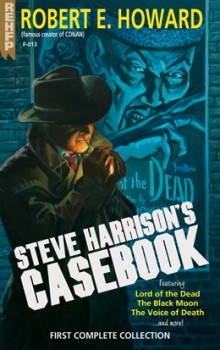
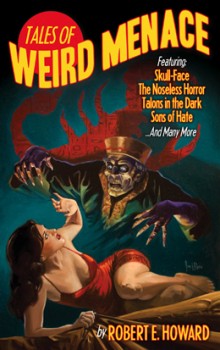 The following article was first published on July 28, 2016 at the now defunct REH: Two-Gun Raconteur blog. Thank you to John O’Neill for consenting to reprint my odd stray article so it is archived at Black Gate, which is home to over 275 of my articles written over the past decade. Thank you to Damon Sasser without whom the original article would not exist. Minor editorial changes have been made to the original text.
The following article was first published on July 28, 2016 at the now defunct REH: Two-Gun Raconteur blog. Thank you to John O’Neill for consenting to reprint my odd stray article so it is archived at Black Gate, which is home to over 275 of my articles written over the past decade. Thank you to Damon Sasser without whom the original article would not exist. Minor editorial changes have been made to the original text.
It has become fashionable to regard Robert E. Howard’s Steve Harrison as the author’s lone failure. Much is made of what Howard expressed in letters about disliking hardboiled detective stories as both an author and a reader. Emphasis is placed on the fact that very few of the Steve Harrison stories found a market in the author’s lifetime. Critics measure the Steve Harrison tales against Hammett and Chandler and dismiss Howard’s efforts with disdain. All of this ignores how the character first came to prominence in the late 1970s when Berkeley Books collected “Lord of the Dead” and “Names in the Black Book” in Skull-Face.
I first discovered Robert E. Howard through the adventures of Conan and Kull from Marvel Comics. My youth in the 1970s had seen me leave behind Tarzan movies for the far more exciting Ape Man adventures found in DC and Marvel’s monthly titles. These stories led me to challenge my younger self to read the wonderful Ballantine editions of Edgar Rice Burroughs’ Jungle Lord. As a comics fan, the cover art by Neal Adams and Boris Vallejo was what first ensnared me. A trio of low budget AIP movies with Doug McClure, Peter Cushing, and Patrick Wayne introduced me to the lost worlds of Caspak and Pellucidar and from there to ERB’s original novels which were back in print from Ace Books with gorgeous Frank Frazetta cover art. Shortly thereafter, Marvel’s Tarzan journeyed to Pellucidar. This string of discoveries convinced me there were so many more fantastic worlds to discover.
I found those worlds in Robert E. Howard. Consequently, Edgar Rice Burroughs was never quite the same. If Burroughs was Paradise, then Howard was Paradise Lost and his damned forbidden fruit was tasty. I was a latecomer to church and resented losing Porky Pig and Popeye on Sunday mornings. My parents bought me a Children’s Bible with Old Testament illustrations of the Flood and Samson’s blind rage to hold my attention. Along came Marvel’s Conan and Kull comics and suddenly I found characters that could rival Tarzan while living in an Old Testament world that was far more interesting than anything I was learning from my new faith at the time.
Fold-out poster for Skull-Face by Ken Kelly
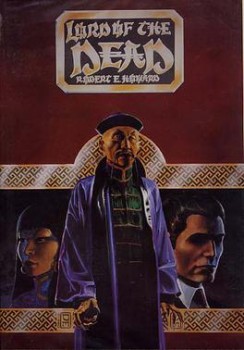 When I was twelve and thirteen, I was obsessed with Ian Fleming’s James Bond novels. When I was fourteen, I discovered Sax Rohmer’s Fu Manchu series and James Bond suddenly seemed as bland as his name. Rohmer opened a world that was to become my favored retreat from reality and one that continues to resonate with me in middle age. The Berkeley edition of Skull-Face and the Donald M. Grant edition of Lord of the Dead immediately caught my eye when I first stumbled upon them in my twenties. Here was Robert E. Howard moving away from the fantastic fiction of the forgotten prehistoric past and turned loose on the twentieth century. I was in my forties before I discovered El Borak and Kirby O’Donnell. Along with Steve Harrison, I now knew that Howard’s modern world characters held a greater fascination for me than his noble barbarians.
When I was twelve and thirteen, I was obsessed with Ian Fleming’s James Bond novels. When I was fourteen, I discovered Sax Rohmer’s Fu Manchu series and James Bond suddenly seemed as bland as his name. Rohmer opened a world that was to become my favored retreat from reality and one that continues to resonate with me in middle age. The Berkeley edition of Skull-Face and the Donald M. Grant edition of Lord of the Dead immediately caught my eye when I first stumbled upon them in my twenties. Here was Robert E. Howard moving away from the fantastic fiction of the forgotten prehistoric past and turned loose on the twentieth century. I was in my forties before I discovered El Borak and Kirby O’Donnell. Along with Steve Harrison, I now knew that Howard’s modern world characters held a greater fascination for me than his noble barbarians.
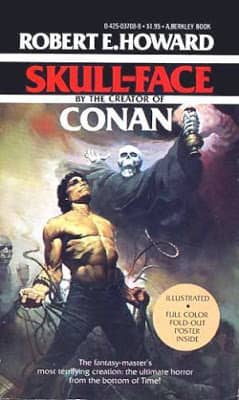 Howard’s forays into Weird Menace, despite the influence of Sax Rohmer, were very much in keeping with his sword and sorcery fiction. Steve Harrison was a latterday barbarian as equally comfortable swinging a battle axe as he was slinging a pistol. Harrison teamed with Khoda Khan (from the El Borak stories) to battle the sorcerous Erlik Khan. The two men seemed like a modern variation on Kull and Brule the Pict. When Harrison left seedy, fog-shrouded River Street to trail a voodoo cult to Bayou country, he could have been in Stygia. Those expecting traditional hardboiled fare will be disappointed, but fans of Howard’s fantastic fiction will find much that proves the author’s talents were not bound by time and place. Steve Harrison, like Nayland Smith with Fu Manchu, was granted a roving commission to run down the sort of exotic crimes most white crime fighters of the 1930s were ill-equipped to handle.
Howard’s forays into Weird Menace, despite the influence of Sax Rohmer, were very much in keeping with his sword and sorcery fiction. Steve Harrison was a latterday barbarian as equally comfortable swinging a battle axe as he was slinging a pistol. Harrison teamed with Khoda Khan (from the El Borak stories) to battle the sorcerous Erlik Khan. The two men seemed like a modern variation on Kull and Brule the Pict. When Harrison left seedy, fog-shrouded River Street to trail a voodoo cult to Bayou country, he could have been in Stygia. Those expecting traditional hardboiled fare will be disappointed, but fans of Howard’s fantastic fiction will find much that proves the author’s talents were not bound by time and place. Steve Harrison, like Nayland Smith with Fu Manchu, was granted a roving commission to run down the sort of exotic crimes most white crime fighters of the 1930s were ill-equipped to handle.
The last bit is the key for me. Howard’s characters are men out of time. Whether Kull or Conan or Solomon Kane or Steve Harrison or El Borak, his heroes are men without a home who function best in exotic environments. They are old souls who can cope with a world that is no longer safe, white, and civilized. They instinctively cope with Eldritch terrors, Oriental cults, and serpent worshippers. They understand the world is far older than European civilization with its fragile veneer of security and its simplistic view of science and history. They are not afraid to step beyond conventions to a dangerous, Pagan world unrestricted by civilization. So it is for readers for over 80 years who understood Howard’s fiction was finite, but the promise it held was infinite.
For anyone who accepts the common belief that Howard fumbled when he created Steve Harrison, I encourage you to re-visit “The People of the Serpent,” “Names in the Black Book,” and “Graveyard Rats” and see them for the masterly Tales of Weird Menace they are and enjoy the world of wonder found in all of Howard’s work regardless of its setting. The fantastic was not limited to the ossified past, it is as accessible today as it was yesteryear if the reader steps outside the confines of the safe and conventional to discover the Gnostic truths and uncharted territory that lie in wait round every bend. The key is to keep reading and open your mind. Ultimately, that is the message of Burroughs, Howard, Rohmer, and every other author who raised the lantern high and fearlessly shone light upon a world of shadows.
William Patrick Maynard is the licensed continuation author for the Sax Rohmer literary estate. His third Fu Manchu thriller, The Triumph of Fu Manchu will be published by Black Coat Press later in 2019.
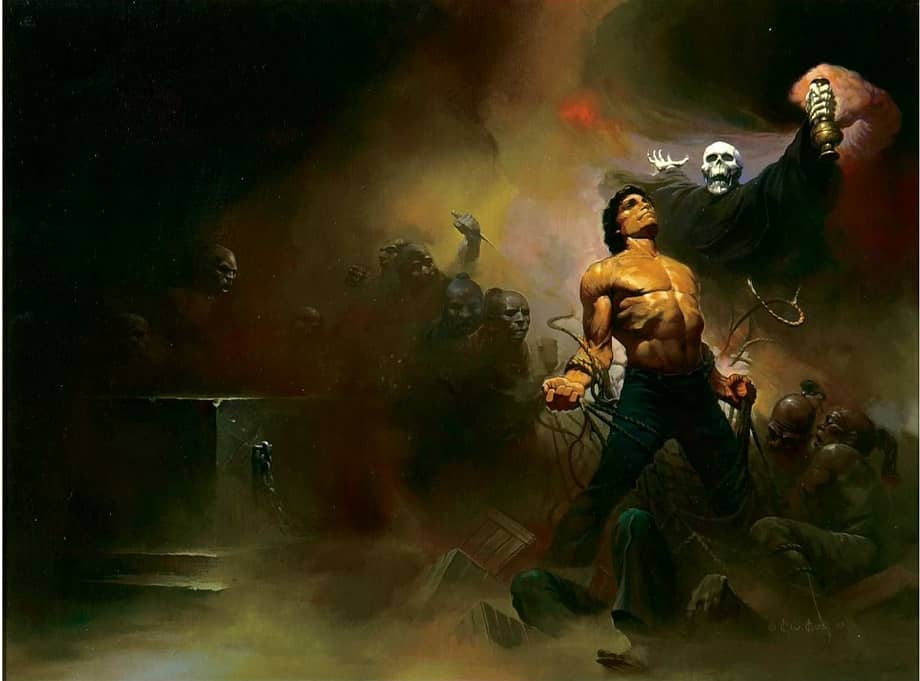
Because, as we all know, I have no pride, I’ll piggyback on Bill’s post and link to an essay I did here at Black Gate, on the Harrison stories.
Delightful article William, thank you.
Thank you kindly, Mr. Waltz.
Mr. Byrne, I believe your article was the reason Damon asked me to write about Steve Harrison for Two-Gun Raconteur in the first place.